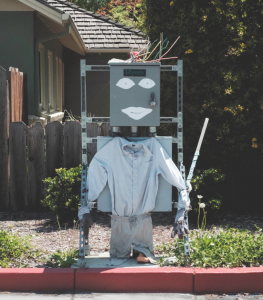Analyst firm Forrester published a new report this week with this bold title, “The End Of Advertising As We Know It: CMOs Should Shift Billions From Ad Interruptions To Branded Relationships.” Not even could, but should!
Jack Neff at AdAge explains based on an interview with the study’s lead analyst, James McQuivey, that the expectation is that big brands are going to spend far less money on advertising and instead invest in bots, apps, and personal assistants. Technologies that give users what they want (to buy) either when they ask for it, or when the tech believes they’d like it based on their behavior.
 “Society doesn’t need advertising like it used to,” the study’s landing page says. Consumers don’t, they mean, and maybe brands. But as it also notes, “this annoying feature of modern life has funded the global economy more effectively than any other source.” (I’m certainly thankful for the way that ads have helped fund my career for the past 10 years, allowing me to build a media audience and innovate with technology to capture insights about life and the world. I hope my customers have and will continue to make a ton of money!)
“Society doesn’t need advertising like it used to,” the study’s landing page says. Consumers don’t, they mean, and maybe brands. But as it also notes, “this annoying feature of modern life has funded the global economy more effectively than any other source.” (I’m certainly thankful for the way that ads have helped fund my career for the past 10 years, allowing me to build a media audience and innovate with technology to capture insights about life and the world. I hope my customers have and will continue to make a ton of money!)
McQuivey says that consumers of today and tomorrow are shifting away from passive activities and media, and experiences that facilitate commercial interruptions. “Interruption only works if consumers spend time doing interruptible things on interruption-friendly devices,” the report says according to AdAge. “Once they can get what they want without leaving themselves open to interruptions – whether through voice interfaces or AI-driven background services – they will feel even more hostile to ad interruptions than they claim to be today.”
Forrester says this could be part of why big brands cut spend on display ads by as much as $2.9 billion next year. For context, total ad spend by brands globally last year was $496 billion, according to IPG, which that firm says will slow to growing only 3.6% in 2017, vs 5.7% growth between 2015 and 2016. Doing the math, that means this year there will be roughly $10b less in growth than there would have been if this year’s growth rate was as high as last year’s. And though these are two different stories, it’s not hard to believe that $2.9 billion of that $10 billion in non-growth could be money diverted from online display ads and shifted to some degree to bots, apps, and personal assistants. I wonder what the other 2/3 of the slowdown in growth could be attributed to?
What does it mean?
Let’s ponder what it could all mean for a moment, using a Foresight model called Incasting. It’s super simple, you just picture a prospective scenario in the future and you answer 3 questions.
Scenario: In 5 to 10 years, a large percentage of the advertising economy has been redirected to the automated provisioning of purchase opportunities to consumers in the form of call-and-response bots, mobile or other standalone apps where ecommerce is the primary or a secondary function, or personal assistants – which make it easy to purchase goods you have asked for or might want.
Question 1: What might be unusually good in this scenario?
- Surprise! You got recommended something you didn’t even know you wanted and it’s great!
- Right on! You consumed less stuff that you really didn’t need, and then we didn’t all die from climate collapse.
Question 2: What might be unusually bad in this scenario?
- Oops! The formerly ad-supported press collapses and our social and self-awareness takes a nose dive. We slip into unchecked authoritarian politics. (Though we are beginning to learn why people pay to subscribe to media outlets, too.)
- Peter Pan: there are lots of new jobs at the end of the automated bot line, opportunities to be uniquely human all queued up for us, but people might not retrain fast enough to do those jobs. (“I have complete faith in the ability to identify job gaps and develop educational tools to address those gaps,†said Danah Boyd, a principal researcher at Microsoft Research and founder of Data and Society, a research institute, in an interview published yesterday. “I have zero confidence in us having the political will to address the socio-economic factors that are underpinning skill training.â€)
Question 3: How will going to work be different in this scenario?
- People being human will stand at the end of a series of machine analysis, processes, and maybe interactions with customers. Hopefully the machines will be good enough they won’t leave people screaming for another human immediately.
- People will be hired for writing and optimizing narratives and detection algorithms for bots. As my friend Schlomo Rabinowitz said recently, “don’t carpet-bomb your company name all over the socials,” and “If people spent as much time writing bot copy as the four coders of [classic 1977 computer game] Zork did writing their narrative, maybe their bot would be just as memorable.â€
Those are just a few of my thoughts about what it could look like for a lot of ad dollars to shift to bots and personal assistants. Hopefully it would be a big boost to utility for consumers, and hopefully less intrusive than the status quo.
Photo: Robot on Unsplash by Charlie Deets.